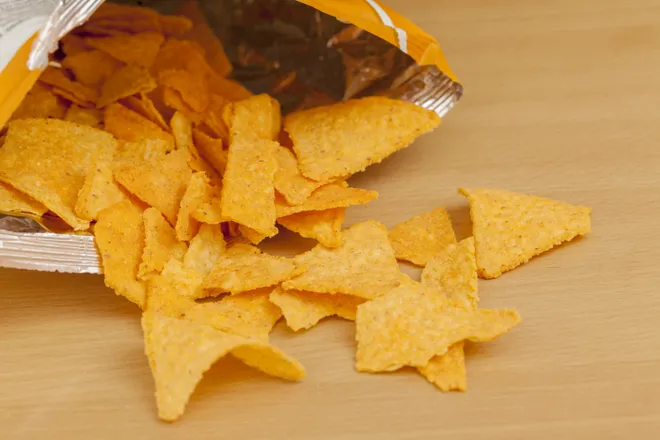What is the Dorito theory and can it explain your worst habits?
Imagine biting into the perfect potato chip. What's the first thing you think of?
"Yum. Now I want another," probably.
But that nutrient-deficient potato chip probably isn't as satisfying as chomping on a protein-filled steak that actually fulfills your body's needs and won't leave you craving more later.
Welcome to the "Dorito theory" circulating on TikTok. It posits that "eating potato chips is addictive because the peak of the experience is when you're tasting it, and not after," according to the creator of a popular video discussing it. "There's nothing that exists actually once the experience is done."
In short: "Experiences that aren't truly satisfying are maximally addictive." This may apply beyond potato chips to other habits in your life, like the infinite scroll on TikTok, or even something as serious as toxic relationship patterns.
While experts we spoke to hadn't heard of the theory, they understand it and agree it can apply elsewhere in your life. It's worth some introspection if this sounds like you.
"Not experiencing satiation when engaging in a particular activity or in a relationship can influence you into staying in a situation that is not truly satisfying, not healthy and not happy," says psychologist Reneé Carr.

Instant gratification not enough to sustain us
We feel instant gratification in many aspects of our lives. Every like on Instagram, match on a dating app or silly, superficial compliment from an acquaintance can make us smile. Temporarily.
"Because you experience just enough satisfaction, we mistakenly think that full satisfaction is possible – leading us to stay longer or invest more energy unnecessarily," Carr says. "The 'just enough' also prevents us from seeing a person or situation for exactly who or how it really is and to then overemphasize the positives and minimize the negatives."
To that end: "Bad habits can be related to unfulfilling romantic relationships, friendships we should have let go of years ago, jobs that no longer work for us," says Alice Shepard, clinical psychologist and the owner of Mirielle Therapy Practice. "These require thoughtful decisions and actions. Perhaps we want to return to the beginning when these situations felt good. Unfortunately, drugs, alcohol and excessive consumption of yummy but nutritionally empty foods won’t solve our problems."
The truth about 'our worst habits'
Those same little gratifications are not replacements for engaging in meaningful conversation with loved ones, enjoying a deep connection on a date or laughing a lot with close friends.
Consider the "Dorito theory" as a way to identify your problem areas. "Our worst habits have that addictive drive to them," says Rita McNamara, a lecturer in cross-cultural psychology at Victoria University of Wellington in New Zealand. "The difference between this kind of pleasure that drives addiction and true satisfaction is that addiction comes from chasing the peak experience, while satisfaction is a quiet beast. You actually can't chase satisfaction, it just arises. So there's nothing to get addicted to."
Important:Josh Peck’s drug, alcohol use after weight loss sparks talk about 'addiction transfer'
How to break out of 'Dorito' addiction
Awareness is the first step to solving most of life's struggles. But awareness alone won't break the cycle.
If you experienced trauma and can't get out of your negative feedback loop, a combination of yoga, meditation and therapy could help retrain your nervous system.
"You have to re-configure those associations in your nervous system between the less sensational, healthy thing you really want – a healthy meal, a stable and supportive relationship – and the highly sensational, unhealthy thing that is giving you that hit – the intense flavor of snack foods, the drama of an unhealthy relationship," McNamara says.
So whether it's a Dorito or a troubling partner, put down the (maybe metaphorical) chips and think before you take your next bite.
Keep in mind:Are you ruining your relationship without even realizing it?

Disclaimer: The copyright of this article belongs to the original author. Reposting this article is solely for the purpose of information dissemination and does not constitute any investment advice. If there is any infringement, please contact us immediately. We will make corrections or deletions as necessary. Thank you.







